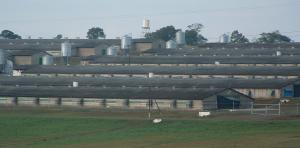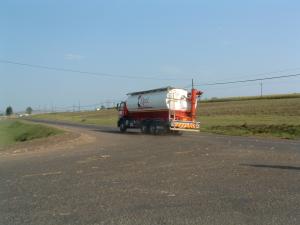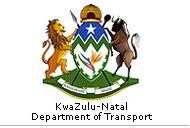 |
Poultry ProductionThe poultry industry consists of three distinctly separate
branches, namely, the day-old chick supply industry, the
broiler industry and the egg industry. Day-Old Chick Breeders and HatcheriesThe main producers of day-old chicks in KZN (and the rest
of South Africa) have affiliations to the major broiler
and egg producers.
The genetics for the hybrid breeds used both in broilers
and egg production are franchised from overseas breeding
companies, with local breeders operating within very
stringent controls by the parent companies.
There are also limited numbers of independent hatcheries
that buy breeding stock and supply birds to smaller
poultry concerns.
The main concentration of hatcheries is around the
Midlands, but there are also established producers in
coastal areas and Southern KZN.

Hatchery
|
BroilersThe broiler industry in KwaZulu-Natal is concentrated
mainly in the areas of Umlaas Road, Eston, Lion Rivers,
Camperdown and Vryheid.
The production process in the broiler industry is divided
into the following components:
- The breeder (egg farm) provides fertile eggs to
the hatchery.
- The hatchery (usually part of the breeding farm)
incubates fertile eggs to produce day-old-chicks.
- Chicks are sold to broiler producers, where they
are grown over 6-7 weeks to 1.5-2.0 kg.
- At about 42 days, the broilers are slaughtered or
sold live to dealers.
- At the processing plants the slaughtered birds are
packed as dressed chicken, or packed frozen pieces, or
further processed to products like deboned chicken,
polony, viennas, etc.
In South Africa commercial producers slaughtered an
estimated 558 million broilers during 2004. This figure
would since have increased to approximately 600 million
broilers
based on the production figure in 2006 and 2007.
South Africa’s annual poultry meat production is in
excess
of 1,1 million tons. The production is indicated in the
graph below. In 2006 chicken production was estimated
at 1,152,000 tons with approximately 188, 000 tons being
imported, mainly from Brazil.

|
The South African chicken industry projections for 2007
are estimated at 1,143,800 tons.
Large-scale broiler producers contribute about 80% of
total poultry meat production, with the rest made up of
mature chicken slaughter(culls), small-scale
and “backyard” poultry production, ducks,
geese, turkeys
and other specialised white-meat products.
The poultry sector in South Africa uses approximately 69%
of the production output of the feed industry, and15 -25%
of total maize production. Maize is the major ingredient
of broiler meal, which is made up of maize (70% - 75%)
and sunflower, soya, fishmeal and other ingredients.
The KZN broiler industry is one of the major agricultural
sectors in the province with production sold nationally by
some of the largest producers in the country.

Broiler Processing Farm
|
Egg productionAbout 341,576 tons of eggs were sold in South Africa in
2006 through various channels. The egg industry employs
about 10,000 workers (in the large-scale sector) all over
the country, and is thus an important rural employer.
The egg industry comprises three distinct sectors:
- Day-old chick production (Estimated at 20 million
per annum by the SA Poultry Association.
- Point-of- lay hen production.
- Egg production.
The egg production process begins with the breeder stock
and hatchery. Three large companies dominate the market
for day-old chickens.
Birds are then raised for about 16 weeks and sold to
laying farms as point-of-lay hens. Once placed in the
laying batteries, the hens remain in the cages until they
cease laying and are then sold as culls. The total flock of laying birds in South Africa in 2006
was estimated to be 20.5 million hens. In 2006 egg
production reached a record 328,986 cases per week.
During the second half of 2006 egg production increased by
12,7% compared with the corresponding period in 2005. One
case is equivalent to 30 dozen (360 eggs),so that the
total
production is an estimated 118,4 million eggs per
week.
The production in KwaZulu-Natal is estimated at about 13%
of the national total, or 44,000 tons of eggs per year.
The
main egg producers are situated in Camperdown, Lions
River, Mount Currie, Estcourt, Newcastle, Eshowe, Vryheid
and Port Shepstone. TransportRoad transport is used for all poultry activities
because of the convenience and efficiency, including
movements of feed, birds, litter, shavings and other
supplies. This is also because all loading and unloading
is done on the farms.
Poultry producers realise the importance of the care for
their expensive birds, and therefore comply with the
Livestock Welfare Co-ordinating Committee (LWCC) rules.
These are designed to ensure that all potential
slaughter/production animals (across species) are treated
humanely along the supply chain, from the loading process
on the farm, through transportation to the pre-
slaughtering
and physical slaughtering process at the
abattoir (SAMIC, 2000). Bulk feed is usually delivered by the suppliers in auger
discharge vehicles directly into the silos on the farms.
Birds are transported by the producer or the chick
supplier in open flat-deck vehicles.
Eggs have relatively short shelf life, and the
distribution
is therefore a critical element of the overall marketing
process, often handled by the producing companies or
closely tied contractors.
Packed broilers are delivered by the producers in
refrigerated vehicles to point of sale or, in some cases,
use is also made of third party distribution companies,
especially for long-distance and inter-provincial
movements of frozen chickens. The vehicle configurations vary from rigid trucks to
interlinks, depending on the distance to the market and
tonnage to be transported.

Bulk Feed Vehicle
|
|
 |



